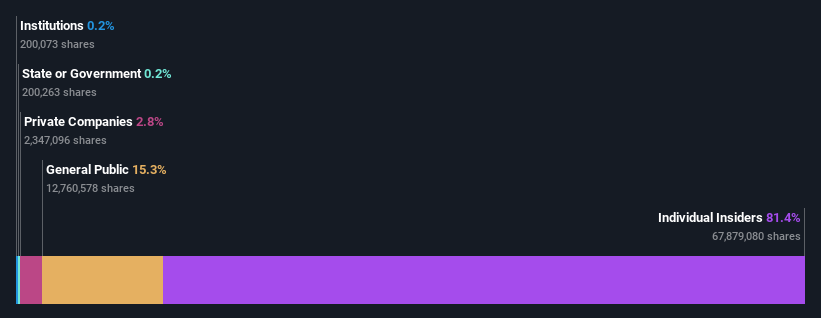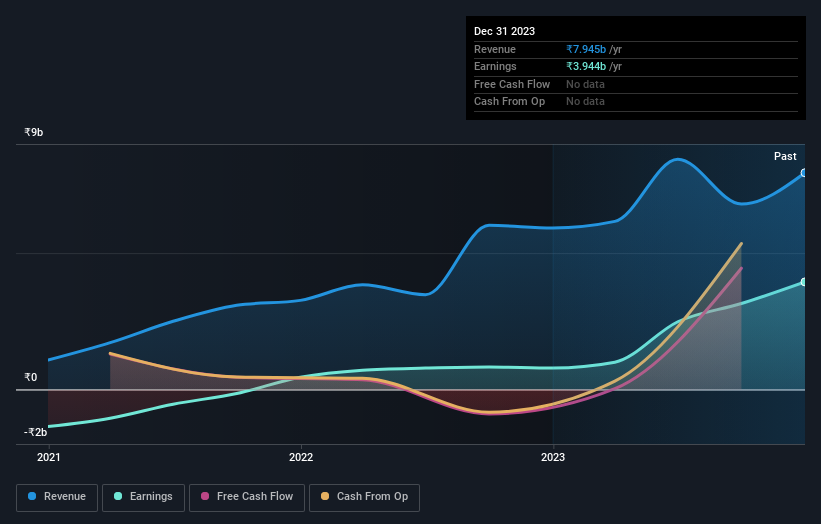- India
- /
- Real Estate
- /
- NSEI:GANESHHOUC
Ganesh Housing Corporation Limited's (NSE:GANESHHOUC) most bullish insider, CEO Shekhar Patel must be pleased with the recent 9.1% gain

Key Insights
- Insiders appear to have a vested interest in Ganesh Housing's growth, as seen by their sizeable ownership
- The top 2 shareholders own 72% of the company
- Past performance of a company along with ownership data serve to give a strong idea about prospects for a business
To get a sense of who is truly in control of Ganesh Housing Corporation Limited (NSE:GANESHHOUC), it is important to understand the ownership structure of the business. We can see that individual insiders own the lion's share in the company with 81% ownership. In other words, the group stands to gain the most (or lose the most) from their investment into the company.
Clearly, insiders benefitted the most after the company's market cap rose by ₹5.3b last week.
In the chart below, we zoom in on the different ownership groups of Ganesh Housing.
View our latest analysis for Ganesh Housing

What Does The Lack Of Institutional Ownership Tell Us About Ganesh Housing?
Institutional investors often avoid companies that are too small, too illiquid or too risky for their tastes. But it's unusual to see larger companies without any institutional investors.
There are multiple explanations for why institutions don't own a stock. The most common is that the company is too small relative to funds under management, so the institution does not bother to look closely at the company. On the other hand, it's always possible that professional investors are avoiding a company because they don't think it's the best place for their money. Ganesh Housing's earnings and revenue track record (below) may not be compelling to institutional investors -- or they simply might not have looked at the business closely.

Hedge funds don't have many shares in Ganesh Housing. Looking at our data, we can see that the largest shareholder is the CEO Shekhar Patel with 37% of shares outstanding. For context, the second largest shareholder holds about 35% of the shares outstanding, followed by an ownership of 3.8% by the third-largest shareholder. Interestingly, the second-largest shareholder, Dipakkumar Patel is also Top Key Executive, again, pointing towards strong insider ownership amongst the company's top shareholders.
To make our study more interesting, we found that the top 2 shareholders have a majority ownership in the company, meaning that they are powerful enough to influence the decisions of the company.
Researching institutional ownership is a good way to gauge and filter a stock's expected performance. The same can be achieved by studying analyst sentiments. We're not picking up on any analyst coverage of the stock at the moment, so the company is unlikely to be widely held.
Insider Ownership Of Ganesh Housing
The definition of company insiders can be subjective and does vary between jurisdictions. Our data reflects individual insiders, capturing board members at the very least. The company management answer to the board and the latter should represent the interests of shareholders. Notably, sometimes top-level managers are on the board themselves.
Insider ownership is positive when it signals leadership are thinking like the true owners of the company. However, high insider ownership can also give immense power to a small group within the company. This can be negative in some circumstances.
Our information suggests that insiders own more than half of Ganesh Housing Corporation Limited. This gives them effective control of the company. So they have a ₹51b stake in this ₹62b business. Most would be pleased to see the board is investing alongside them. You may wish todiscover (for free) if they have been buying or selling.
General Public Ownership
The general public-- including retail investors -- own 15% stake in the company, and hence can't easily be ignored. While this size of ownership may not be enough to sway a policy decision in their favour, they can still make a collective impact on company policies.
Next Steps:
It's always worth thinking about the different groups who own shares in a company. But to understand Ganesh Housing better, we need to consider many other factors. For example, we've discovered 2 warning signs for Ganesh Housing (1 makes us a bit uncomfortable!) that you should be aware of before investing here.
If you would prefer check out another company -- one with potentially superior financials -- then do not miss this free list of interesting companies, backed by strong financial data.
NB: Figures in this article are calculated using data from the last twelve months, which refer to the 12-month period ending on the last date of the month the financial statement is dated. This may not be consistent with full year annual report figures.
New: Manage All Your Stock Portfolios in One Place
We've created the ultimate portfolio companion for stock investors, and it's free.
• Connect an unlimited number of Portfolios and see your total in one currency
• Be alerted to new Warning Signs or Risks via email or mobile
• Track the Fair Value of your stocks
Have feedback on this article? Concerned about the content? Get in touch with us directly. Alternatively, email editorial-team (at) simplywallst.com.
This article by Simply Wall St is general in nature. We provide commentary based on historical data and analyst forecasts only using an unbiased methodology and our articles are not intended to be financial advice. It does not constitute a recommendation to buy or sell any stock, and does not take account of your objectives, or your financial situation. We aim to bring you long-term focused analysis driven by fundamental data. Note that our analysis may not factor in the latest price-sensitive company announcements or qualitative material. Simply Wall St has no position in any stocks mentioned.
About NSEI:GANESHHOUC
Ganesh Housing
Engages in the real estate and construction businesses in India.
Flawless balance sheet with solid track record and pays a dividend.


